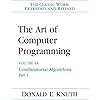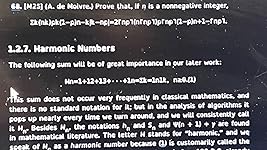Art of Computer Programming, The: Combinatorial Algorithms, Volume 4A, Part 1


Buy Now, Pay Later
- – 6-month term
- – No impact on credit
- – Instant approval decision
- – Secure and straightforward checkout
Ready to go? Add this product to your cart and select a plan during checkout.
Payment plans are offered through our trusted finance partners Klarna, Affirm, Afterpay, Apple Pay, and PayTomorrow. No-credit-needed leasing options through Acima may also be available at checkout.
Learn more about financing & leasing here.
30-day refund/replacement
To qualify for a full refund, items must be returned in their original, unused condition. If an item is returned in a used, damaged, or materially different state, you may be granted a partial refund.
To initiate a return, please visit our Returns Center.
View our full returns policy here.
Recently Viewed
Description
The Art of Computer Programming, Volume 4A: Combinatorial Algorithms, Part 1Knuth’s multivolume analysis of algorithms is widely recognized as the definitive description of classical computer science. The first three volumes of this work have long comprised a unique and invaluable resource in programming theory and practice. Scientists have marveled at the beauty and elegance of Knuth’s analysis, while practicing programmers have successfully applied his “cookbook” solutions to their day-to-day problems.The level of these first three volumes has remained so high, and they have displayed so wide and deep a familiarity with the art of computer programming, that a sufficient “review” of future volumes could almost be: “Knuth, Volume n has been published.” –Data Processing DigestKnuth, Volume n has been published, where n = 4A.In this long-awaited new volume, the old master turns his attention to some of his favorite topics in broadword computation and combinatorial generation (exhaustively listing fundamental combinatorial objects, such as permutations, partitions, and trees), as well as his more recent interests, such as binary decision diagrams. The hallmark qualities that distinguish his previous volumes are manifest here anew: detailed coverage of the basics, illustrated with well-chosen examples; occasional forays into more esoteric topics and problems at the frontiers of research; impeccable writing peppered with occasional bits of humor; extensive collections of exercises, all with solutions or helpful hints; a careful attention to history; implementations of many of the algorithms in his classic step-by-step form. There is an amazing amount of information on each page. Knuth has obviously thought long and hard about which topics and results are most central and important, and then, what are the most intuitive and succinct ways of presenting that material. Since the areas that he covers in this volume have exploded since he first envisioned writing about them, it is wonderful how he has managed to provide such thorough treatment in so few pages.–Frank Ruskey, Department of Computer Science, University of VictoriaThe book is Volume 4A, because Volume 4 has itself become a multivolume undertaking. Combinatorial searching is a rich and important topic, and Knuth has too much to say about it that is new, interesting, and useful to fit into a single volume, or two, or maybe even three. This book alone includes approximately 1500 exercises, with answers for self-study, plus hundreds of useful facts that cannot be found in any other publication. Volume 4A surely belongs beside the first three volumes of this classic work in every serious programmer’s library.Finally, after a wait of more than thirty-five years, the first part of Volume 4 is at last ready for publication. Check out the boxed set that brings together Volumes 1 - 4A in one elegant case, and offers the purchaser a $50 discount off the price of buying the four volumes individually.p> The Art of Computer Programming, Volumes 1-4A Boxed Set, 3/e ISBN: 0321751043 Read more
Publisher : Addison-Wesley Professional
Publication date : January 12, 2011
Edition : 1st
Language : English
Print length : 912 pages
ISBN-10 : 0201038048
ISBN-13 : 40
Item Weight : 3.25 pounds
Dimensions : 2 x 6.7 x 9.4 inches
Part of series : The Art of Computer Programming
Frequently asked questions
To initiate a return, please visit our Returns Center.
View our full returns policy here.
- Klarna Financing
- Affirm Pay in 4
- Affirm Financing
- Afterpay Financing
- PayTomorrow Financing
- Financing through Apple Pay
Learn more about financing & leasing here.
Similar Products
Top Amazon Reviews








